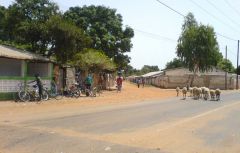Gambia (Republic of The Gambia)
Das an der Westküste Afrikas gelegene Gambia, mit der Hauptstadt Banjul, ist mit 11.295 km² der kleinste Flächenstaat. In einer Vereinbarung zwischen England und Frankreich wurde seine 740 km lange Grenze im Jahre 1888 festgelegt, sie folgt dem Verlauf des Gambia-Flusses auf einer Länge von ca. 480 km und hat einer Breite zwischen 10 und 50 km. Bis auf den Küstenabschnitt, der am Atlantischen Ozean liegt und eine ungefähre Länge von 80 km hat, ist Gambia von dem 20mal größeren Senegal umschlossen.
Das Klima ist tropisch und besteht aus einer ausgeprägten Trocken- und Regenzeit. Die Trockenzeit, die von November bis Mai dauert, wird von dem trockenen nordöstlichen Wind aus der Sahara, genannt Harmattan, beeinflusst. In dieser Zeit steigen die Temperaturen auf 21 bis 27°C an, bei einer relativen Luftfeuchtigkeit von 30 bis 60 %.
Die Regenzeit beginnt im Monat Juni und dauert bis zum Oktober. Der meiste Regen fällt dabei in den Monaten Juli und September.
Die offizielle Landessprache für die schätzungsweise 1,64 Mio Einwohner ist Englisch, doch auf dem Lande werden die lokalen afrikanischen Sprachen (u. a. Mandinka, Wolof, Djola, Fula) zur Verständigung genutzt.
Die Bevölkerung besteht bis zu 90 % aus Moslems und der Rest ist in Animisten und Christen, zumeist katholisch, aber auch methodistisch, baptistisch und anglikanisch aufgeteilt.
At the west coast of Africa lain the Gambia, with the capital Banjul, is at 11.295 km² the smallest surface state. In an agreement between England and France its 740 km long border was specified in the year 1888, it follows the process of the Gambia river on a length of approx. 480 km and has width between 10 and 50 km. Up to the coast region, which is because of the Atlantic ocean and an approximate length of 80 km has, the Gambia of the 20 times larger Senegal is enclosed.
The climate is tropical and consists of a pronounced drying and rain time. The drying time, which lasts from November to May, is called affected from the dry northeast wind the Sahara, Harmattan. In this time the temperatures rise to 21 to 27 °C, with a relative air humidity from 30 to 60 %.
The rain time begins in the month June and lasts by October. Most rain falls thereby in the months July and September.
The official national language for those roughly 1.64 million inhabitant is English, but in the country the local African languages (among other things Mandinka, Wolof, Djola, Fula) are used for the communication.
The population consists up to 90 % of Muslims and the remainder is mostly catholic in Animisten and Christians, in addition, methodistisch, baptistisch and anglikanisch divided.
Reise-Tipps
Reisedokumente
Zur Einreise, nach Gambia, benötigen Deutsche einen gültigen Reisepass. Der deutsche Kinderausweis wird anerkannt, ein Lichtbild ist unabhängig vom Alter des Kindes erforderlich. Das Einreisedokument muss mindestens 6 Monate gültig sein.
Ein Visum wird bei Einreise erteilt und ist 21 bis 28 Tage gültig. Bei einem längeren Aufenthalt muss ein Antrag (gebührenpflichtig) beim gambischen "Immigration Department" auf Aufenthaltsverlängerung gestellt werden.
Einreisebestimmungen für deutsche Staatsangehörige können sich kurzfristig ändern, ohne dass das Auswärtige Amt davon unterrichtet wird.
Zollvorschriften
Die Dinge des täglichen Bedarfs dürfen abgabenfrei eingeführt werden. Doch bei der Einfuhr von verschreibungspflichtigen Medikamenten, die mit Betäubungsmitteln leicht verwechselt werden können, wird die Vorlage eines englischsprachigen Attestes des behandelnden Arztes verlangt.
Impfschutz
Der Impfschutz gegen Tetanus, Diphterie, Polio, Gelbfieber und Hepatitis A, bei Langzeitaufenthalt über 3 Monate auch Hepatitis B wird empfohlen.
Malaria: Es besteht ein ganzjähriges Malaria-Risiko, das jedoch während und nach der Regenzeit noch steigt. Es empfiehlt sich auch bei Kurzaufenthalten eine angemessene und kontinuierlich durchgeführte Malaria-Prophylaxe. Dazu gehören sowohl Mückenschutzmaßnahmen, wie Mückennetz, bedeckende Kleidung und Verhalten auch eine medikamentöse Chemoprophylaxe, die mit dem Arzt abgesprochen werden sollte.
Journey Tipps
Travel documents
For the entry, to the Gambia, you need a valid passport. The entry document must be valid at least 6 months. A visa is given with entry and is 21 to 28 days valid. With a longer stay than 28 days a request (chargeable) must be set with Gambian "Immigration Department" to residence extension.
The conditions of entry can change at short notice, without the other countries are informed of it.
Customs regulations
The things of the daily need may be introduced free of charge. But with the import of use uprequiring medicines, which can be easily confounded with narcotics substances, the collecting main of an english certificate of the treating physician is required.
Inoculation protection
The inoculation protection against Tetanus, Diphterie, Polio, yellow fever and hepatitis A, with long-term stay over 3 months also hepatitis B is recommended.
Malaria: There is an all-season malaria risk, which still rises however during and after the rain time. An appropriate and continuously accomplished malaria prophylaxis is recommended also with short stays. To it belong both mosquito preventive measures, and mosquito net, covering clothes and behavior also a medicamentous chemoprophylaxis, which should be agreed upon with the physician.




